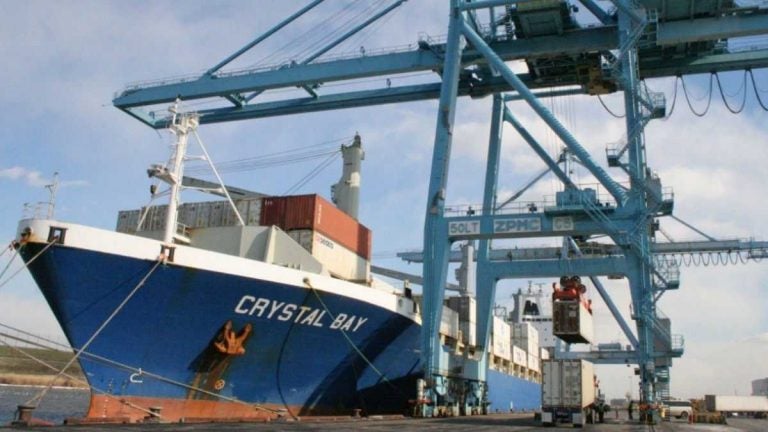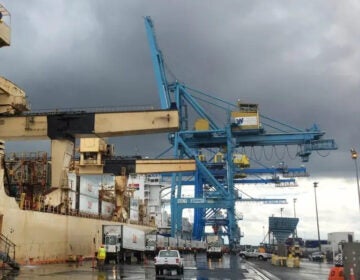Pa. district judge delivers another setback to Delaware on Edgemoor port expansion project
This is the latest stumbling block for the new Edgemoor terminal at the Port of Wilmington. Delaware argued it should be allowed to intervene in the lawsuit.

The Port of Wilmington in Delaware. (Courtesy of Port of Wilmington)
From Philly and the Pa. suburbs to South Jersey and Delaware, what would you like WHYY News to cover? Let us know!
This story was supported by a statehouse coverage grant from the Corporation for Public Broadcasting.
A federal judge in Pennsylvania has rejected Delaware’s attempt to intervene in a lawsuit that has stymied port expansion plans in Wilmington, saying the state waited too long to try to join.
Diamond State Port Corporation, the quasi-public entity that oversees the Port of Wilmington, along with private port operator Enstructure moved to become parties in the lawsuit after the judge’s ruling invalidated key permits for the planned $635 million container terminal at the Edgemoor property on the Delaware River.
Philadelphia Regional Port Authority (PhilaPort) and ports affiliated with Holt Logistics Corp. sued the U.S. Army Corps of Engineers last year after the agency’s 2022 approval of the new Delaware container facility. They have raised legal, regulatory and other challenges for years to stop the Edgemoor project, arguing it will divert business away from their port facilities.
U.S. District Judge Mark Kearney of the Western District of Pennsylvania sided with the ports in late October, deciding the Army Corps acted “arbitrarily and capriciously departed from its own procedures” when signing off on the project. The Army Corps can appeal.
Diamond State and Enstructure argued this month they should be allowed to be “movant-intervenors,” a legal term for groups that intervene as a party to the lawsuit to protect their ability to appeal that ruling. They accuse the upriver ports of having “weaponized” federal permitting procedures to help their own economic interests. Kearney’s ruling has stalled the project, endangering hundreds of millions of dollars in public-private funding already committed to the project, and potentially threatening thousands of jobs and tens of millions annually in tax revenue.
“Movant-intervenors do not know whether the Corps will appeal the court’s decision,” their motion argued. “Therefore, movant-intervenors seek to intervene in this matter to preserve the right to appeal.”
But Kearney dismissed the argument because he said the motion was not made in a timely manner.
“Diamond State and Enstructure admit knowing and following the suits from day one, but chose not to intervene to conserve resources notwithstanding investing hundreds of millions of taxpayer money into the Edgemoor Project,” Kearney stated.
The judge also dismissed the argument Diamond State and Enstructure made that they should be allowed to intervene because of the amount of economic investment at risk.
“It is not for us to weigh the political, economic, or job-promoting merits or demerits of an application to an agency,” the judge’s decision said. “We only review the agency’s decision making, which we completed with the assistance of the diligent parties before us.”
Gov. John Carney’s office declined to comment. A spokesperson for Leo Holt, CEO of Holt Logistics, said he had no comment.
In a statement, Wali Rushdan, an attorney representing Diamond State and Enstructure, said, “We respect the Court’s decision and fully intend to work with the Corps ‘to re-review’ the permit applications as the Court directed, so we can move this important project forward.”
Delaware River Main Navigational Channel Deepening
Diamond State purchased the Edgemoor property in 2017. The land was formerly a Chemours manufacturing site. Efforts to expand the port aim to take advantage of a project authorized by Congress in 1992 to deepen the riverbed of the main navigational channel.
Delaware and New Jersey opposed that dredging. Philadelphia partnered with the Corps, became the sole non-federal sponsor and paid $140 million of the total $400 million cost. The project allowed the city’s ports to capitalize on the expansion of the Panama Canal, which allowed bigger ships to reach East Coast ports and with more cargo.
The Edgemoor terminal would take advantage of the main channel deepening. Delaware obtained approval from the Army Corps to dredge a turning channel that would connect to the main navigational channel. The upriver ports argued the proposed new turning basin in front of Edgemoor would consume the entire breadth of the main navigational channel in that area, creating a bottleneck for ships heading to Philadelphia ports.
Judge Kearney faulted the Army Corps for allowing Diamond State to submit a permit application that included a study that failed to look at how the turning basin might impact traffic in the channel. He also ruled the federal agency should have required Delaware’s Diamond State to obtain a “Statement of No Objection” from PhilaPort as it is the non-federal sponsor of the main channel deepening project, which the Corps argued was a “harmless error.”

Get daily updates from WHYY News!
WHYY is your source for fact-based, in-depth journalism and information. As a nonprofit organization, we rely on financial support from readers like you. Please give today.







